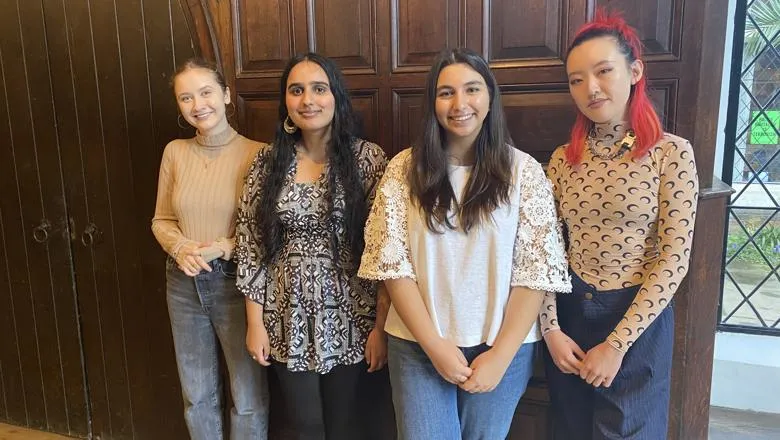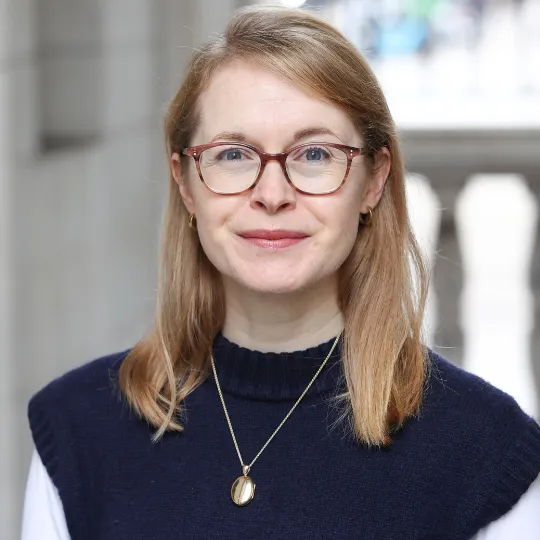Thanks to Undisciplined Spaces, I am now more confident about pursuing a career in research and further exploring community research in the future. [...] The programme has taught me important research skills and practices that are rarely taught at university or emphasised in traditional research, such as compassion, empathy and sensitivity. These are practices that I will definitely be incorporating in my future projects.
Martina Chen, BA European Politics
18 November 2021
King's students address marginalisation in six countries through community-based projects
Eight students developed activist research initiatives in their local communities to tackle issues of diversity and discrimination.

As part of the cocurricular Undisciplined Spaces programme, undergraduate students from the faculties of Arts & Humanities and Social Science & Public Policy were partnered with community researchers to identify issues of marginalisation or exclusion in their local areas to tackle. Funded by the Faculty of Arts & Humanities and supported through a programme of training and mentorship provided by The Young Foundation's Institute for Community Studies (ICS), the students have engaged with issues in communities across six different countries and produced participatory photography, films, zines, policy briefs, visual art, and teatime books to display their findings. The programme gave students a unique opportunity to develop their skills and gain experience in community research whilst making a meaningful positive impact in their local communities.
After a year of carrying out their projects virtually, the students came together to celebrate their achievements and the power of community-led and participatory research. During a celebratory event, participating students presented their initiatives and shared what they had learned throughout the programme. Afra Fathibitaraf (BA English) explored the diasporic experiences of the Iranian community in Toronto, Canada. Reflecting on how the project challenged her preconceived notions on the topic, she said: “Undisciplined Spaces taught me that I still have so much more to learn about my community. It is only by sharing our microphones and listening to our communities that we may begin to understand their experiences.” From interviews with Iranian immigrants, Afra produced a ‘teatime’ book that captured their experiences, inviting readers “to share a cup of tea with my participants.”
Many students were motivated to explore issues that were personal to them and that reflected their experiences. Through interviews and visual storytelling, Martina Chen (BA European Politics) investigated the racism, marginalisation, and emancipation experienced by the Chinese community in Prato, Italy. Her findings were summarised in an impactful and emotive participatory film (available to view on YouTube) that aims to, “meaningfully connect with the community, amplify community voices and experiences, and produce collective knowledge that can empower the community and increase civic engagement and social mobilisation.”
My project stemmed from the frustration I felt for marginalised students who don't know what they're capable of, and from me to them, I would love nothing more than to encourage them to know their worth, realise their potential, and do their best to take every opportunity they can.
Sameera Mohammed, BA English
Sameera Mohammed (BA English) focused on a topic close to home as she investigated issues of diversity and representation in higher education by interviewing fellow Arts & Humanities students from London universities. She used infographics to highlight how students feel silenced, including direct quotes from her interviews because, as she put it, “Voices of these people are the most important if you want to make change.” Also drawing from the familiar world of higher education, Laura Maxwell (BA History) explored young people's experiences of mental health and isolation in the context of the COVID-19 pandemic and restrictions.
Many of the students saw this programme as an opportunity to shape and inform local policy. After conducting one-to-one interviews online and via telephone, Carolin Klein (BA Political Economy) produced a policy proposal to advise local authorities on the integration struggles of female refugees in Germany. “The aim of the study was to give a voice to the marginalised group of refugee women, presenting them as active agents for change while demanding policy action to recognise their unique struggles,” she said. Carolin also reflected on her own role in the project and the community: “The program helped me use my privilege for good: In collecting data on the needs of refugee women in a policy paper, I could amplify the voice of a marginalised community, finding my role as an ally.”
Undisciplined Spaces demonstrates how energetic, outward-looking, and resourceful our undergraduate students are at King’s. Despite the constraints of a global pandemic, our students managed to build meaningful collaborations with local and global communities, forging positive social impact through community research.
Dr Elizabeth Scott-Baumann, Faculty of Arts & Humanities Pro Vice Dean for Impact & Knowledge Exchange
Also interested in public policy, ByeongKyu Jun (BA International Relations) researched how homeless people find and receive available resources and support, using Whitechapel, London, as a case study. After carrying out a survey in conjunction with local charities, ByeongKyu produced a small card that details relevant support for homeless people. He highlighted how in public policy as well as in his studies, community experience is often side-lined but, through Undisciplined Spaces, he was able to gain a new perspective on the importance of lived experience in policymaking. As he put it, “While I always focused on big actors in the international community in my study, I started to see more diverse - smaller or often unheard - voices in our society ... After the program, I now think about different people in our society that can be impacted differently by the policies or decisions that I study. The programme indeed made me consider wider perspectives.”
Other student projects focusing on our local communities in London included Saffron Brown Davis (BA French & Philosophy) who highlighted the lived experiences of those affected by displacement in Brixton, complementing secondary quantitative data with online interviews and participatory photography (compiled in a Zine). Also in London, Rebecca Lindsay (BA Philosophy & Spanish) conducted one-to-one interviews to explore the unique experiences of gentrification of the Latinx community in Elephant & Castle.
We're delighted to be working with King’s College London on Undisciplined Spaces, co-creating a pioneering programme of creative, activist research projects. The event showcased some inspiring student-led projects, highlighting the value of peer research, which The Young Foundation promotes and supports via our Peer Research Network. Through Undisciplined Spaces, students around the world demonstrate the power and potential of community research, connecting young people with issues that matter in their communities.
Emily Morrison, Head of The Young Foundation's Institute for Community Studies
The first of its kind for the university, Undisciplined Spaces is an opportunity for students to gain valuable experience and training in community-led research while making a positive and meaningful difference in their local communities.
For more information about Undisciplined Spaces and the student projects, visit the project webpage: https://www.kcl.ac.uk/research/the-institute-of-community-studies-undisciplined-spaces-project
The student projects
- Afra Fathibitaraf (BA English), Leaves in the Wind: Stories of Iranian-Canadians in Toronto
- ByeongKyu Jun (BA International Relations), Exploring understanding of homelessness and the accessibility of support services for people experiencing homelessness in Whitechapel
- Carolin Klein (BA Political Economy), The Gendered Problem of Migration: A Policy Proposal for Integration in Germany
- Laura Maxwell (BA History), Exploring young people's experiences of mental health and isolation against the backdrop of Covid-19 restrictions
- Martina Chen (BA European Politics), Understanding Collective Action in the Chinese community of Prato
- Rebecca Lindsay (BA Philosophy & Spanish), Elephant & Castle: A tale of gentrification
- Saffron Brown Davis (BA French & Philosophy), A community Influx: Perspectives on displacement in Brixton
- Sameera Mohammed (BA English), We are Here: ethnic minority experiences of Arts and Humanities courses in higher education
In this story
Related departments
- Service at King’s
- King’s & London
- Global
- Faculty of Arts & Humanities
- Faculty of Social Science & Public Policy
- Department of English
- Department of History
- Department of War Studies
- Department of Political Economy
- Department of European & International Studies
- School of Politics & Economics
- Department of Philosophy


